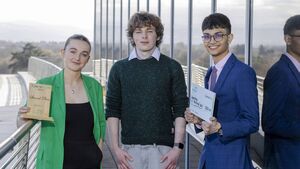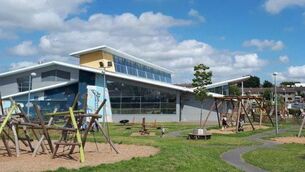Athy student nets energy competition prize

Cleaner Grid Competition Final at EirGrid at The Oval 160 Shelbourne Road Ballsbridge Dublin
A KILDARE student has been awarded second place, and a prize of €6,000, at the annual EirGrid Cleaner Grid Competition, following an event held in Dublin.
Ethan O’Brien from Athy, alongside his fellow University of Galway student teammates Ruchit Ghandi and Sarah Jane Hughes, named EcoShift Engineers, were together awarded a prize of €6,000, with half the winnings going to the students and half to the school.
A delighted Ethan said: “Achieving net zero by 2050 is such a huge challenge, so we wanted to create something that would help work towards achieving that for Ireland.
"It was a great exercise to learn how we are going to further sustainability and sustainable energy. I know so much more about the power grid now and it was a lot of fun too.”
The group were judged by Joanna Donnelly, meteorologist with Met Éireann, Vish Gain, technology and business journalist with the Sunday Business Post, Professor John Barry, Professor of Queens University Belfast and EirGrid’s own head of engineering and asset management, Louise O’Flanagan.
Their project narrowly missing out to team Todhchaí Glas from University College Dublin, who claimed first place.
This year’s theme asked students to “Present your vision of what the growing energy sector will need to look like in 2050 to have sustainably achieved net-zero emissions”.
The CleanerGrid competition run by EirGrid aims to foster innovation and creativity by encouraging third-level students to showcase their skills in solving critical energy challenges, with a focus on sustainability, efficiency and clean energy technologies.
Entrants were asked to show how the grid will need to change to allow for more renewable sources and less conventional generation; including what government policies will need to be in place, how the economy will be affected, how the grid will need to adapt, how technology can help achieve this goal, or any other relevant points they identify in order to create a resilient energy system for the future.
Among the ideas put forward by the five competing teams of finalists from DCU, University of Galway, UCD and Trinity College Dublin included pumped hydro energy storage, leveraging our coasts through offshore wind and the use of artificial intelligence in grid enhancement.





